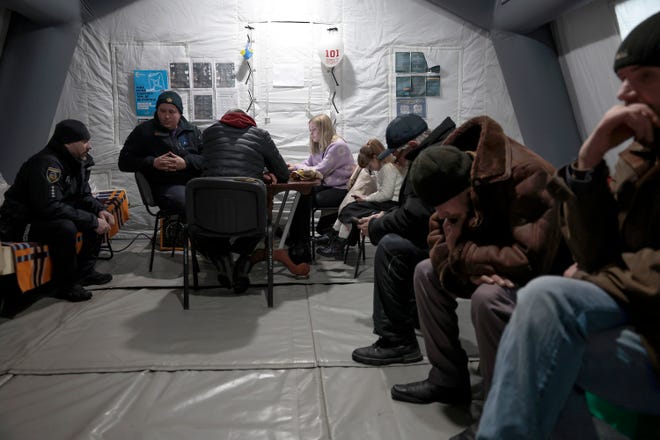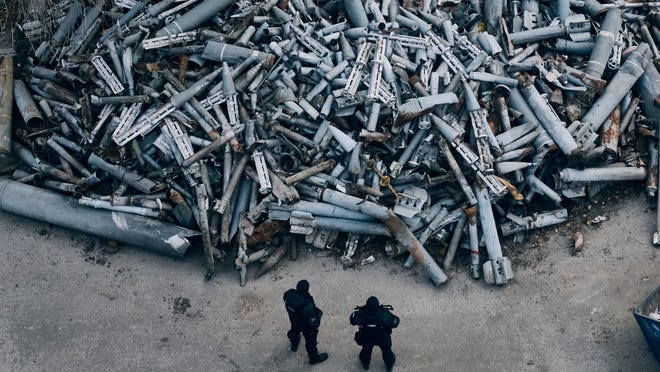Russian President Vladimir Putin hailed the disputed annexation of Ukrainian territories Wednesday as a crucial military victory, saying it has made the Sea of Azov an inland sea for Russia.
The Sea of Azov borders Ukraine and Russia, but Putin illegally annexed land on Ukraine’s side. Putin, speaking with members of his Human Rights Council, said even Peter the Great fought for access to the sea centuries ago.
And he said the recent sham referendums in the annexed territories proved residents want to be part of Russia. Still, Putin acknowledged the “special military operation” he refuses to call a war “could be a lengthy process.”
Putin dismissed concerns that he would use nuclear weapons in Ukraine, calling them a deterrent. He has said Russia will use “all available means” to protect its territory, including the annexed areas of Ukraine.
“We haven’t gone mad,” he said Wednesday. “We are fully aware of what nuclear weapons are.”
UKRAINE STRIKES RUSSIA:US says it ‘neither encouraged nor enabled’ drone attacks

Other developments:
►The number of civilian casualties in Ukraine may be three times higher than the U.N. estimate, Fredrik Wesslau, the outgoing deputy head of the European Union Advisory Mission in Ukraine, told the Kyiv Independent.
►A major increase in people trying to learn Ukrainian has been the year’s most notable trend, according to the language app Duolingo, which registered more than 1.3 million such instances since the war began in late February. The spike was driven in part by interest in countries that have taken in a large number of Ukrainian refugees.
►At least 16 people were killed when a truck carrying military personnel collided with a minibus in a Russian-controlled area of the hotly contested Donetsk region of Ukraine, Russian authorities said.
►The European Union on Wednesday proposed travel bans and asset freezes on almost 200 more Russian officials and military officers as part of a new round of sanctions.
►The Help Ukraine Center, a group of volunteers that brings in aid through its main warehouse in neighboring Poland, appealed to donors on its website: “NO MORE CLOTHES PLEASE.” The center still seeks medical products, food and hygiene products.
Putin tries to quash reports of another mobilization, complaints about first one
In his televised comments Wednesday, Putin tried to shoot down rumors of a second mobilization of reservists and said, “There is no need for the Defense Ministry and the country to do that.”
A Washington think tank says that’s an attempt at appeasing the public and controlling war information after the first mobilization in September generated outcries and prompted hundreds of thousands of Russian men to flee the country.
The Institute for the Study of War says Putin is also trying to keep draftees and their families from complaining about the conscription, which was dogged by reports that the new soldiers were poorly trained and equipped and that many ineligible men were forced into service.
Putin “signed a law banning rallies in government buildings, universities, schools, hospitals, ports, train stations, churches, and airports – likely to suppress riots and protests among mobilized men and their families,” the institute said, adding that reports of another mobilization in 2023 have been persistent.
Russia looks to Iran again to boost its dwindling arsenal
Russia is once again turning to Iran as a provider of weaponry to boost a diminished arsenal, raising concerns about the ramifications of their increased cooperation, according to two officials familiar with the matter
Particularly worrisome to the U.S. is the possibility Iran may sell Russia surface-to-surface missiles, in addition to the drones Moscow is seeking to acquire for its continued assault on Ukraine, said a National Security Council official who spoke to the Associated Press on condition of anonymity.
Shahed drones the Kremlin obtained from Iran have played a major role in Russia’s campaign to destroy Ukrainian civilian infrastructure, although Kyiv’s forces have gotten more adept at shooting them down.
A United Nations diplomat who also requested anonymity told the AP that Iran intends to sell Russia hundreds of missiles and drones in violation of the 2015 Security Council resolution that endorsed the nuclear deal between Tehran and six major powers. Russia was one of them, raising the question of what it would be providing Iran in exchange for the weapons.
The growing military ties between the two countries could have “massive implications for security of the region,” the diplomat said.
One-third of Ukrainians driven from homes, most out of country
One-third of Ukrainians have been driven from their homes and the scale of civilian casualties and infrastructure damage is “shocking,” U.N. High Commissioner for Human Rights Volker Türk said Wednesday. Türk, speaking from Ukraine at the end of a four-day visit, said 6.5 million Ukrainians have fled their homes for shelter within the battered nation of more than 40 million people. Another 7.8 million Ukrainians have been recorded as refugees across Europe, he said.
Türk said a new report documents the “willful” killings of 441 civilians in three northern regions that include Kyiv during the first several weeks of the war, homicides that likely constituted a “war crime.”
“I fear that there is one long, bleak winter ahead for Ukraine,” Türk said. “The consequences of the war on the enjoyment of human rights for people in the country have already been devastating, and the prognosis is very worrying.”
Freezing temperatures and lack of heat and running water because of bomb-damaged infrastructure have sharply raised the risk for people already vulnerable across Ukraine, he said, among them the elderly, the very young, the poor and the sick.
“My plea is to everyone engaged in hostilities to respect (humanitarian law) fully, especially in the most difficult, most emotional circumstance,” he said, adding that “a violation by one party does not legitimize violations by another.”
Russia’s U.N. ambassador, Vassily Nebenzia, claimed Ukraine wanted to destroy Russians “so that they stop existing as a country.” He defended the missile and drone attacks on cities, saying attacks targeted infrastructure used for military purposes.
Time names Zelenskyy its person of the year
Time Magazine named Ukraine President Volodymyr Zelenskyy its person of the year, saying, “This year’s choice was the most clear-cut in memory.” The magazine said Zelenskyy “galvanized the world in a way we haven’t seen in decades” and praised his decision not to flee Kyiv after Russia’s invasion Feb. 24.
“From his first 40-second Instagram post on Feb. 25 – showing that his Cabinet and civil society were intact and in place – to daily speeches delivered remotely to the likes of houses of Parliament, the World Bank, and the Grammy Awards, Ukraine’s President was everywhere,” Time wrote. “His information offensive shifted the geopolitical weather system, setting off a wave of action that swept the globe.”
Russia broadcaster wants military to target Kyiv’s Maidan Square
Popular Russian broadcaster Alexander Sladkov urged the Russian military to strike the center of Kyiv “for the sake of peace in the Donbas.” Sladkov suggested attacks target Maidan Square, home to the Independence Monument that honors Ukraine’s liberation from the Soviet Union in 1991. Sladkov said efforts to enter into negotiations aimed at a cease-fire in the Donetsk and Luhansk provinces of the industrial Donbas will remain futile until Kyiv feels the full effect of Moscow’s might.
“Until we make mincemeat of the center of Kyiv, the shelling of Donetsk will not stop,” he said.
NATO expects major Russian offensive in spring
Russia is trying to “freeze” the war to regroup its troops over the winter months before starting a “major offensive” in the spring, NATO Secretary-General Jens Stoltenberg said Wednesday. He said NATO would continue the supply of arms and support to Ukraine despite concerns that Western weaponry stockpiles could be depleted.
Stoltenberg said he had no information on Ukraine’s apparent drone strikes into Russia but said Kyiv was fighting to protect itself as Moscow bombards civilian infrastructure.
“They need a vast amount of ammunition, spare parts and also maintenance,” Stoltenberg said.
Contributing: The Associated Press





